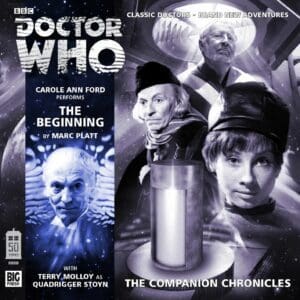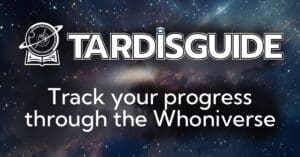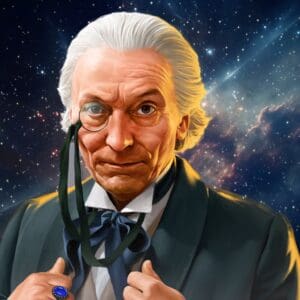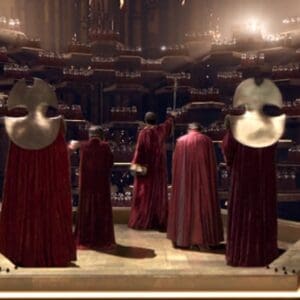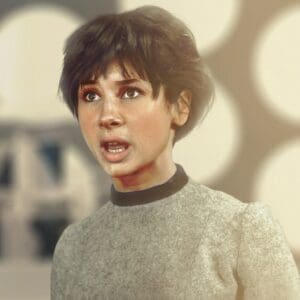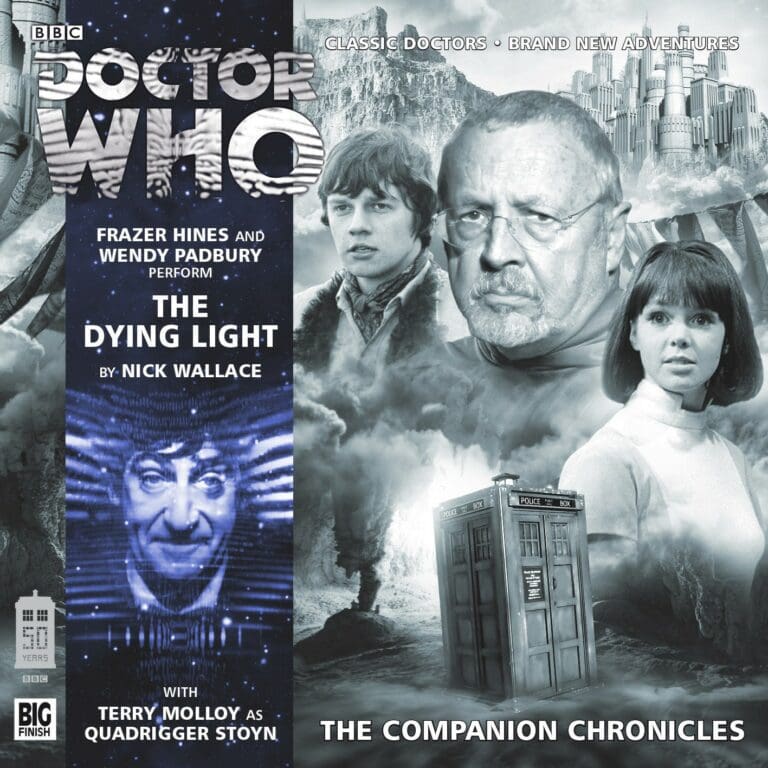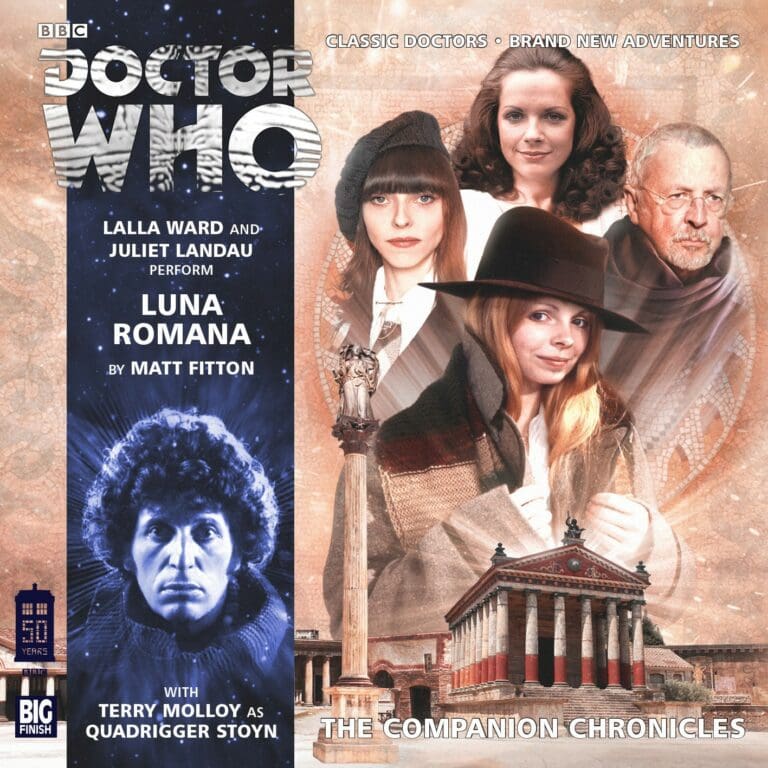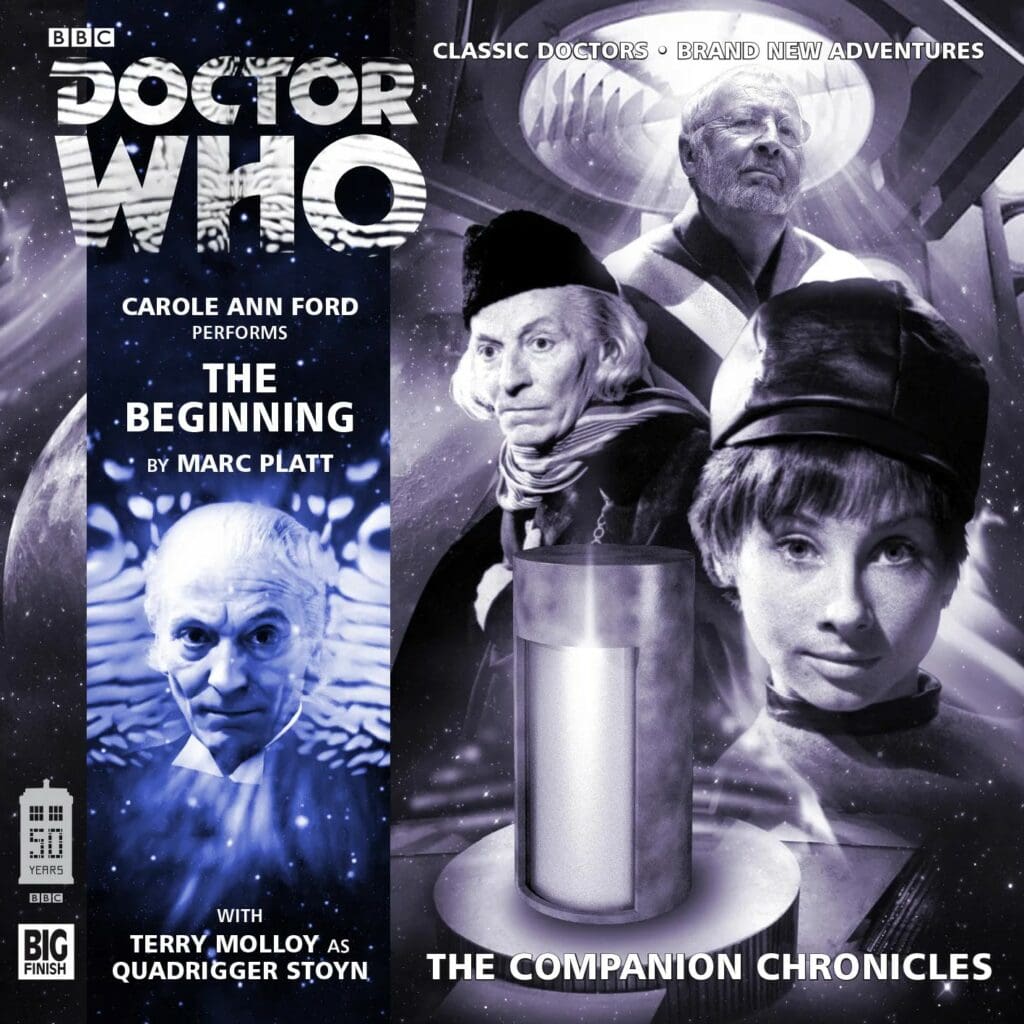
The Companion Chronicles S8 • Episode 5
The Beginning
Sets:
The Companion Chronicles
Reviews and links from the Community
This review contains spoilers
Review of The Beginning by NobodyNo-One
The Beginning - ★★★½☆
The Beginning is an interesting story with a marketing that works against itself. It's not about the Doctor and Susan's departure from Gallifrey, even though we do see a snipt of it in the first few minutes. It's is, in truth, their first travel in the TARDIS. The beginning of what matters. Phrasing it like that reveals my instance on telling much about the Doctor's life in Gallifrey; I'm mostly against it - for me, when you focus on that you miss the point of the series. But I understand who is left frustrated by this. Everybody comes to this story expecting something it isn't. Only the first of a series of weird, weird choices.
For a start, it's the first in a triology in the Companion Chronicles, celebrating the 50th year of Doctor Who. It makes sense to tell us the first adventure ever in a anniversary story, but the element that truly ties the triology is an original character - the man, the legend... Quadriger Stoyn. And I truly can't understand WHY. After their departure from their home planet, the Doctor and Susan are surprised to find a third person on board the TARDIS. You guessed it, it's Stoyn. From the get go, he and the Doctor are on opposite sides, since on of them is a fugitive and the other wants go to back home.
I don't dislike the concept, but I admit it doesn't feel right to have someone else on board before Ian and Barbara enter the picture. It doesn't feel natural. Which is the point, but still. However, his presence in the narrative do bring out interesting facets of the First Doctor. This is an incarnation that it nothing alike the modern public perception of the character in many ways; but especially his moral. This version of the Doctor, even more so before his character development as we see on TV, is marked by bouts of cruelty, selfishness and arrogance. All of that is present here; he doesn't care even a bit about what could happen with Stoyn and sees him as an obstacle in his and Susan's path. That gives us scenes of him sabotaging the TARDIS so Stoyn can't go back to Gallifrey, essentially keeping him a hostage. Much of the clash between them, more so in the second part, revolves around Stoyn trying to get back a piece of the TARDIS the Doctor took with him, which without is impossible to travel, so he can escape. I want to highlight that nothing of this is a problem for me, the opposite actually; it's a very good characterization for the First Doctor and is one of the elements that distinguishes him from his future selves and makes him so interesting for me. There has been some stories in the expanded media that I actually missed his moral ambiguity.
However... Stoyn is an efectivr antagonist, but there in nothing that makes me care about him in a personal level; even though the Doctor is wrong I am never on his side because Stoyn sounds like a jerk all the time; and I don't think the text goes much deeper than him wanting to go back home. There is potential for the future of the character, since the Doctor leaves him in a terrible situation, almost a death sentence, so he has plenty motive to go for revenge. The only moment that gave me any stronger feeling towards him was not for the best; he insinuates himself to Susan and tells the two of them to run away together and leave the Doctor to die. It's nothing very explicit, but his ulterior motives towards her are palpable and it's an element that, for this story, I find out of place and unnecessary.
Susan herself is really good; Caroline Ann Ford's acting obviously matured a lot throughout the years and here she delivers an enthusiastic and emotional performance. The Companion Chronicles are by large narrated in first person by the companions themselves reflecting or remeniscing on a past adventure; and therefore is a format that allows a more psychological and intimate approach to the character than the usual full cast format. This time that is used to its fullest in the first half, since the first twenty minutes are mostly about Susan's feelings about their escape from Gallifrey and her first impressions of the TARDIS. Likewise, when the story picks up where it left off in the second part, the narrative is restructured based on Susan's disorientation due to the sudden change of events. She is also the one who voices the First Doctor and, although I don't think it's as much of a personal or emotionally charged performance, it is done with palpable affection and conveys the character's mannerisms very well.
But I also like the plot itself. The first place they land is actually the Moon, a long, long time ago, at the beginning of the development of life on Earth. One of the twists in the plot is precisely that the Moon is already inhabited by this species called Archaeons. Their meeting with the rest of the cast is friendly at first and marked by the Doctor's sense of adventure and exploration; his and Susan's excitement about discovering new worlds and other people is really cool. In addition to creating some interesting science fiction ideas. Archaeons, apparently, are not carbon-based life forms and therefore their biological and physical functioning is extremely different. Their technologies are also quite weird. There's a scene in the first part that I particularly like in which Susan faces a body of water that behaves strangely and shows distorted reflections of the characters. She is swallowed by water and Ann Ford's performance builds a crescendo of panic and shortness of breath and this sensation of drowning not only literally but also in her feelings. It's perhaps my favorite moment in the entire story.
The narrative takes another turn at the end of the first part when it is revealed that the Archaeons have manipulated the development of life on Earth so that it occurs in an organized way according to their wishes. Their plans are thwarted when they try to enter the TARDIS but inadvertently cause a disturbance that temporally freezes the characters for millions of years; When things return to normal, life on Earth has already developed chaotically, humans already have a colony on the Moon and the Archaeons enter a kind of cultural existential crisis. I like how this plot develops because it deals with one of the central themes of the First Doctor's era, interventionism. Part of the “cruelty” of this phase of Doctor Who is precisely the frequency of addressing fixed points and how History should not be changed; even though this is a contradictory element to the Doctor's own nature because he is, in his own words, a meddler. He even uses this word in this story although I think it is more appropriate a little later in the character's life, when he is already traveling with Vicki. Despite his very strong policy of non-intervention here, he decides to act against the Archeons because they are influencing life in a very extreme way, he does not see this as something natural.
In another story I could talk about this plot from a point of view of determinism or even eugenics. They are valid interpretations but I wouldn't say they are the most relevant this time. The main conflict is order versus chaos. Although they are the interventionist force of the story, the Archaeons serve as agents of order while the Doctor is a chaotic figure. I find it a very interesting approach because normally this role of non-interventionism for the Doctor is associated with maintaining the order of things; and while that still holds true here – he wants to maintain the natural order – the story consciously reverses roles and plays with what is expected of the character.
The Beginning is a very interesting release to discuss and for which I have mainly positive impressions, as is obviously palpable from the text, but it is not on the list of my favorites yet. In the future, who knows.
This review contains spoilers
Review of The Beginning by hallieday
The First Doctor #5
'The Beginning' (2013) from The Companion Chronicles.
As my first ever Big Finish I can't say this was a great introduction, although Carole Ann Ford's performance was plenty fun. Can't say I'm a huge fan of the narrator-style storytelling - not sure if Big Finish is gonna be more like this or more like audio-only television episodes, but I'm hoping more for the latter in future listens. The sequence of The Doctor and Susan's escape is great albeit just about on a par with The Exiles, but once Quadrigger Stoyn and the main narrative is introduced, it becomes quite bare and I was finding myself gradually more disinterested as it went on. The Archaeons are whatever, and - maybe it's because it's so similar to the Caged story from this year - the themes of a race creating another race, here specifically the Archaeons creating humanity, just doesn't do much for me. Stoyn is pretty irritating also, although I do like how The Doctor is instantly shown to be pretty cold by locking him out of the TARDIS at the end, but perhaps he gets better in the two Big Finish stories that narratively follow this one. I suppose I'll see whenever I eventually get around to them.
To call it out again though, Susan's alien-type powers arise here once more with her being able to pick up The Doctor's thoughts as he's laying unseen beside her, so it's exciting to know that this is something that's going to be explored in the extended canon much more than it was too-briefly touched upon in The Sensorites.
This review contains spoilers
Review of The Beginning by deltaandthebannermen
In 2013, to celebrate Doctor Who’s 50th anniversary, Big Finish released a trilogy of Companion Chronicles featuring a recurring character – Quadrigger Stoyn, played by Doctor Who veteran: Terry Molloy.
The first story in the trilogy was The Beginning, written by Marc Platt, featuring Carole Ann Ford as Susan and, as the title suggests, visits the very beginning of the Doctor’s travels in time and space.
In the interview extras on the CD, Carole Ann Ford expresses her disappointment that, despite being about the ‘beginning’ of their travels, she still doesn’t know why the Doctor and Susan ran away from their planet. It may seem odd that a story called The Beginning, released in the 50th anniversary year, doesn’t actually spend an awfully long time on Gallifrey. But the story’s title refers to more than just that most intriguing of events. The story is also about the beginning of the Doctor and Susan’s travels, the beginning of their relationship with the TARDIS and also about the beginning of life on Earth, the Doctor’s favourite and most visited planet.
It is a good story which echoes the early days of the series with its ‘big’ science fiction ideas and sense of wonder and yet manages to cross-pollinate it with later Gallifrey-lore without those elements seeming out of place. There are also some cheeky nods to various inconsistencies in the series’ narrative such as whether Susan named the TARDIS and the looms introduced by Platt in his novel Lungbarrow.
Carole Ann Ford is an excellent reader and performer and Terry Molloy is great in his role as a disgruntled TARDIS engineer. The idea that, when he ‘borrowed’ the TARDIS, the Doctor also accidentally kidnapped a lowly ‘quadrigger’ buried in its inner workings is wonderfully silly and it also allows for contrast in the way Stoyn reacts to the alien Archeons are oppose to the Doctor’s awe, wonder and excitement at making first contact.
The huge time jump between the first and second episodes is a little jarring and I’m not sure it completely works although it does allow Platt to include a little of the telepathy that Susan was once given but was usually ignored on TV. It also brings Lisa Bowerman in for a little cameo as a nurse tending to Susan who meets a grisly end.
The portrayal of the Archeons as sentient globules of silver is suitably alien for a time when the series went out of its way to present all manner of strange alien life and the whole tone and atmosphere of the story really does fit with those early days of exploration and experimentation.
The idea that they seeded life on planet Earth may contradict other versions of how life started on Earth in other Doctor Who fiction but when has Doctor Who ever let its already very loose continuity get in the way of a good story.
A lot of the expanded universe has explored what the Doctor and Susan did before arriving in the junkyard in Totters Lane, to varying degrees of success, but this story fits perfectly with what we know and what we may have imagined happened before two schoolteachers followed Susan home.
Something about this story almost feels mythical, dealing, as it does with the very beginnings of the series but it doesn’t feel bolted on or contradictory. Even with the modern Gallifreyan elements that are included, it works extremely well and is highly recommended.
This review contains spoilers
Review of The Beginning by WhoPotterVian
How the Doctor and Susan's adventures had started has always been a curiosity for Whovians. Whilst many understandably don't want too much revealed about the Doctor's past, it is undeniably interesting to find out what happened when they fled Gallifrey. In the wrong hands, the story could have been potentially damaging for the series due to revealing too much about the Doctor. Thankfully, Big Finish Productions are definitely the right hands (even if the story itself isn't really their strongest).
The Beginning is a part of a series called the Companion Chronicles: basically, each release a companion of the Doctor's narrates a past adventure and one or two supporting actors appear during the story. In this Companion Chronicle, Susan (Carole Anne Ford) talks about her and the Doctor's encounter with a stowaway called Quadrigger Stoyn (Terry Molloy).
Quadrigger Stoyn is never going to be an iconic Big Finish character like Molly Sullivan or Liv Chenka but he is a good enough foil for the Doctor and Susan's attempts to escape Gallifrey. It was a good idea to make him an engineer who was working on the TARDIS the Doctor and Susan stole as it reinforces this Doctor's very rash behaviour. The first Doctor never really thought plans through as well as his successors; it's with later experience that he becomes better at running away. Terry Molloy is great in the role too, making Stoyn an endearingly engaging character.
It's nice how this story ties in neatly with Name of the Doctor too. The TARDIS is clearly of the same look as the capsule shown in the eleventh Doctor episode and there's even a reference to Clara telling the Doctor to steal the faulty TARDIS (Susan describes hearing voices outside the first TARDIS the Doctor is about to enter in Name). Hell, they even manage to fit in a reference to the Hand of Omega - it follows the Doctor into the TARDIS they end up stealing.
Unfortunately, once the Doctor and Susan arrive on their first adventure, it all goes a bit bland. Their first trip finds them arrive on the moon, where they encounter a species called the Archaeons who are interfering with the development of life on Earth. Nothing much really happens, which is a shame because the Doctor and Susan's journey to the repair shop on Gallifrey sounds much more interesting. I think Big Finish would have been better delivering a story entirely about the Doctor and Susan's escape as there are a lot of interesting plot points that weren't resolved in this release. Why were the Doctor and Susan being chased by guards, for instance? What did they do? Why did they have to flee Gallifrey? This would have been a much more engaging story and it could have ended with the Doctor and Susan stealing the TARDIS and thereby beginning their adventures through time an
d space.
Carole Anne Ford is a great narrator though and provides a certain energy to the story. This is a great help for when the story becomes about their first adventure, as it adds some much needed life to an otherwise lifeless TARDIS trip. She seems to know exactly how to engage the reader, making her one of Big Finish's strongest for the Companion Chronicles range.
Overall, The Beginning is interesting when it deals with the Doctor and Susan's escape from Gallifrey but once the focus shifts to their first adventure, it becomes a little dull and uninspiring. Thankfully Carole Anne Ford helps to make the first TARDIS trip feel a bit more energetic, proving herself to be an extremely strong and engaging reader. There are some nice references too to the Clara splinter on Gallifrey and the Hand of Omega; it also feels like a natural before and after of the TARDIS-stealing scene from Name of the Doctor, making it easier to be considered canonical than if the events of Name of the Doctor had been ignored. This story is definitely worth listening to for the scenes where the Doctor and Susan are escaping Gallifrey, just don't expect their first TARDIS trip to deliver anything spectacula
r.
This review contains spoilers
Review of The Beginning by Rock_Angel
Love how this is there first adventure in The Tardis just after the exile, told from Susan point of view we never really get to know what she’s feeling or thinking so its a nice change of pace, after all the range i called the Companion Chronicles.
After they take off The Doctor accidentally kidnapped another time lord called Stoyn, he was the engineer of the ship ... The Doctor kidnapping people since The Beginning. Stoyn is played by Terry Molloy, who you may know as playing davros.
The 1st Doctor is given an ultimatum by Stoyn, leading to him actually hitting the console till it brakes it's an amazing explanation later as to why he can’t properly pilot it. The Tardis lands on a New World it's described perfectly with being so new to The Doctor and Susan but being new it self too. This new world being Earth really sets up there obsession with the planet the two characters have its further added upon near the end.
The three of them encounter some creatures on earth called the Archaeons which are globular beings that see themselves as the creators and Earth is it's petri dish as they are situated on the moon. This leads too the creatures taking things out of The Tardis which creates a massive bang leaving them in a status field surrounding the group. A really good cliffhanger too
The start of part two is haunting, its a flashback of Susan on Gallifrey being taken away from her home. Then suddenly woken up being found by archaeologists in the status field years into the future is genius, the archaeologists study Susan as The Doctor and her make contact.
Slowly deaths of the people who found them start happening, its horrific. The way its described is worms under the skin. The Archaeons now seeking vengeance for the experiment being ruined are now after The Doctor n Susan with Stoyn helping them. Stoyn takes the pair to the Tardis asking The Doctor to take him with them, he declines.
Stoyn then takes Susan hostage trying to convince Susan to travel with him, it was a unique scene which leads to leaving stoyn behind to his fate of The Archaeons to surely never be seen again. The Doctor took this first contact disc they made Susan watch I love that inclusion cause it sets up more of The Doctors fascination with earth.
fun fact: They made a cover before name of the doctor aired and to fit with continuity they changed the cover.
It was such a good story I kept forgetting to take notes, I was heavily invested I loved 1st n Susan's dynamic.
This review contains spoilers
Review of The Beginning by Joniejoon
This one was, to put it bluntly, not fun.
“The Beginning” starts us off with the Doctor and Susan escaping in the Tardis. Leaving Gallifrey behind for the great unknown. After this initial departure, our duo lands on the planet Earth, where life is just starting to develop. Problems quickly arise, however, when we see that this process of natural selection isn’t as natural as it seems.
Let’s start with the obvious. I think this story betrays your expectations quite a bit. Look at that cover. Look at that title. You did not expect this story to be about the beginning of Earth. You expected it to be about the beginning of the Doctor. Even the synopsis does not hint at Earth in the slightest.
And I kind of feel two ways about that. On the one hand, I am not against being surprised. A nice twist on expectations can really work. If a story suddenly goes into the unexpected, you can really get swept off your feet. Think of the Sara Kingdom House trilogy, for example.
On the other hand, this is a big tale to twist away from. This is the foundation of the program. And while many people dislike messing around with that foundation, I think almost everyone is still a little curious. I know I am. On some level, you listen to this story to get answers you should never get. So, because of that curiosity, you pay the 10 bucks for this story. You put it on. You start listening to the Doctor and Susan’s escape. Maybe you even get invested. And 5 minutes later, all the escaping stops to start a “real story” on Earth.
That’s a tough sell. But hey, look on the bright side. Maybe that “real story” is actually very, very good. It starts off with a lot of interesting pieces in play. Maybe it will be worth it!
And then you’re stuck for an hour listening to an absolute slog. Opportunity wasted.
Let’s look at our replacement story: Shortly before their first landing, our duo discovers a man named Quadrigger Stoyn, a Tardis technician who was still on board the ship. An unwilling third traveller. The three of them land on Earth during the early development of man, which is apparently being controlled by a race called the Archaeons. This race is trying to push the human race towards a certain path of evolution. This counts as interfering in the Doctor’s eyes, which leads to a standard conflict between him and the Archaeons.
And already we’ve strayed very far from our unique starting premise. We have now replaced it with the most basic of status quos. Still, even that could work! Remember that everything that happens here is the first time it has ever happened to the Doctor. The story could still play with that!
Why not delve into how this standard story structure came to be? It’s a premise that comes up again and again, so let’s explore the core! How does this Doctor choose a side? What would the consequences of interfering actually lead to? And, since we have Stoyn, how do the Doctor’s ideals hold up to those of other time lords? What’s the big difference? Is there even one? This is THE first adventure, so maybe even make the Doctor uncertain, more passive. Make him realize why he has to take a stand at all! Even if it is to uphold the status quo! But that kind of depth isn’t here, and that leads to weird leaps in logic.
The villains in this story are a good example of those leaps. For all intents and purposes, the Archaeons come across as scientist. They aren’t hostile, but curious. They show intellect and a willingness to understand what’s around them. Only when the Doctor threatens to shut them down, do they become aggressive. Then they’re suddenly presented as villains. Their curious nature is completely gone.
So my question is, how do the Archaeons differ from human scientists? They aren’t time travellers and don’t necessarily have knowledge from the future. They’re just doing an experiment. The creatures they’re experimenting on are nothing more than globs and fish at this point in time.
Imagine the Doctor barging into a lab of human scientists who are doing experiments on lab rats. He urges them to shut down because rats will in the far future become the dominant race of this planet. You’d think he was a madman. Why would you believe him? Yet this story takes his side without question.
And that’s a crime in such an early story. It’s unearned heroism without backbone. It shows the Doctor as always right from day one. That’s a disservice to all the growth that’s, at this point, still to come.
No that the Doctor has thoughtlessly condemned them, the Archaeons become ruthless, faceless villains. They’re trying to reset their experiment and start from the beginning. They see humans as a failure and want to start again. Their scientific nature is gone. The Doctor stops them, leaves Stoyn behind because he sympathized with them and goes on with his life. Having learned nothing on his very first adventure.
“The Beginning” should have been a story of fundamentals. It had loads of options to choose from. It could’ve focused on the actual escape, the moral foundations of our hero, the role of interference, the start of a famous story structure, the difference in the Doctor’s perspective to other Time Lords. It should have been a base that all later adventures benefit from, even if it is in the smallest of ways.
But it gives up on that role completely. It does nothing unique. It is a filler story, made on auto pilot. The only real difference is really, really poor placement in the Doctor’s timeline. Realistically, it would be a 5, or a 4. But then you look at the external factors. The title, the cover and the synopsis all hype it up as THE origin story, only to drop it after 5 minutes in favor of a dull, boring, average tale. And that makes it lesser. If a story places itself here, at the very start, it better have some backbone. Otherwise, it shouldn’t exist at all.
External Reviews / Opinion pieces
Doctor Who: Alternative Seasons - Season 0: To Be Exiles
Submitted by Joniejoon
450,000,000 BC: The Beginning – A History of the Universe
Submitted by deltaandthebannermen
Community Ratings
(Updates coming soon:)
Add the last X members who rated it here
Add number of Favs, and who they are, here
